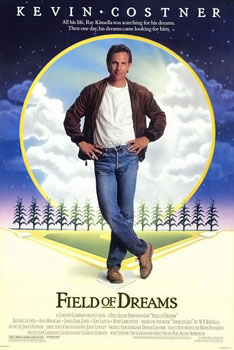Written by W.P. Kinsella
Narrated by Grover Gardner
Run Time: 7 hours and 46 minutes
Publisher: Blackstone Audio/Houghton Mifflin
Growing up, my dad shared his love of sports with my sister and I. The two sports he loved most were baseball and football. My sister played softball for years, often playing first base or pitcher while I operated the scoreboard or was the bat boy for some of her league games. I played T-ball at a young age, but I was terrible at it.
Years later, Dad and I would take occasional sabbaticals from California to Arizona, where I was born and where he grew up, to watch spring training baseball. By March, the desert heat would make the ballpark feel like it was summer, with some stadiums having open-air barbecues and sunbathers soaking up the UV rays on towels beyond the outfield fences. Hope is renewed for a successful season for each club, even for the legions of Cubs fans who make the annual pilgrimage to Mesa for spring training, despite their team not having won a World Series title in more than 100 years.
It is with this frame of reference that I recently read the classic book Shoeless Joe, or as its film version is known, Field of Dreams. The book, published in 1982 and made into an audiobook in 1991, is a wonderfully told story of an Iowa farmer named Ray Kinsella who hears the now-famous voice in his corn field "If you build it, he will come." As he builds a baseball field, Shoeless Joe Jackson, the famous Chicago White Sox outfielder indicted as part of the 1919 Black Sox scandal, appears. Eventually, Ray sets off on an adventure to meet author J.D. Salinger and little-known player Archibald "Moonlight" Graham. But as he is away, the farm is in danger of being snatched from Ray by his brother-in-law and business partner who don't see the value of the baseball diamond.
The book is solidly enjoyable as it focuses on the passing of bygone eras. It celebrates everything old-fashioned, from day games at ballparks to carnivals and older farming techniques. Some of these pay off while others didn't quite work for me. There's a whole subplot that involves Ray's brother and a traveling carnival that I didn't care about as much as I should have. The novel runs at such a quick pace, though, that it didn't detract from the main story. Amusingly, the book made me like J.D. Salinger, even though I really didn't like The Catcher in the Rye when I read it in high school. Gardner gives a great performance as the audiobook's narrator, providing just the right tone to fit each character, especially Salinger.
Grade: 4/5 stars. Despite an ending that felt a little too all-over-the-place, the book is a love letter to baseball and nostalgia.
Field of Dreams (1989)
Written for the screen and directed by Phil Alden Robinson
Rated PG for some language and mild thematic elements
Run Time: 1 hour, 47 minutes
Distributor: Universal Pictures
In the interest of full disclosure, this is my favorite baseball movie, but I think that's in part because of how heavily it focused on the father-son relationship. In the book, the relationship between Ray and his father was a key part in the story, but the movie strips down the narrative to have the relationship be center stage. For example, there's a subplot unique to the movie about censoring questionable books that ties back into the relationship, since author Terrence Mann is blamed for the split. (Due to fears of litigation from Salinger, the character of Mann was created).
Two of my favorite scenes in the movie and book are almost verbatim from each other. The first is Ray's first meeting with Moonlight Graham in the ex-player's Minnesota office. Played by screen icon Burt Lancaster, Graham is resigned to hoping for another shot at the majors after realizing that "we just don't recognize the most significant moments of our lives while they're happening."
The second is the famous speech given by James Earl Jones' Mann about how "the one constant through all the years, Ray, has been baseball."
But what commentary on the movie would be complete without the scene that makes grown men cry? In the movie's final scene, the father-son relationship is healed, despite the father wearing a Yankees jersey. (In the book, he only played in the minor leagues and hated the Yanks).
Grade: 5/5 stars. While others may like Bull Durham or The Natural from the many 80's-era baseball movies, I'll gladly take Field of Dreams over them any day. The book's themes of faith in what you hold dear stand out and it's father-son subplot became the central plot in the movie.
Field of Dreams was nominated for three Academy Awards, including Best Picture, Best Adapted Screenplay and Best Original Score. Robinson went on to write and direct the 1992 hacker film Sneakers, as well as direct an episode of the lauded miniseries Band of Brothers and the action film The Sum of All Fears. James Horner conducted the music, one I play frequently, and went on to conduct the music for the likes of The Rocketeer, Apollo 13, Braveheart and Titanic, the latter of which won him an Oscar.
The field and farm where they shot the movie still stands and has been visited by more than a million visitors since the film's release. The field is near the town of Dyersville, Iowa and is routinely named as one of the top places to visit for baseball fans.


No comments:
Post a Comment